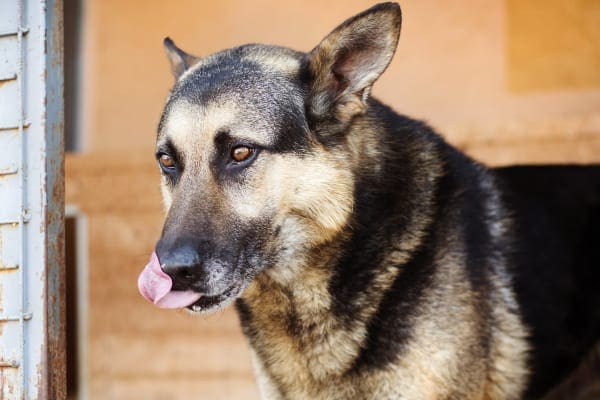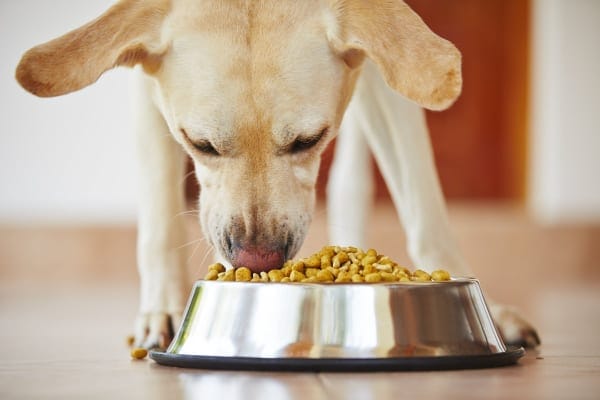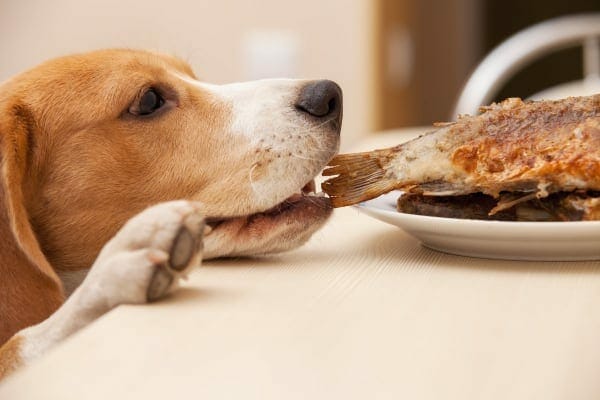You may suffer from acid reflux, but did you know the same can happen for your furry friend? Acid reflux in dogs is a very real problem. Integrative veterinarian Dr. Julie Buzby shares why acid reflux occurs, what symptoms to watch for, and the medications, foods, and natural remedies used for acid reflux treatment in dogs.

Humans and dogs have such a special bond. It’s almost as if we can sense what the other is feeling sometimes—both emotionally and physically. Of course, I want all of my patients to remain healthy. But I will admit I am slightly intrigued when an owner brings in their dog for symptoms they have noticed in themselves as well.
Could Rusty have acid reflux in dogs?
Such was the case with Rusty, a 4-year-old English Bulldog. I greeted him and his dad in the exam room, and dad cut right to the chase. “Can dogs get indigestion?” he asked. “They can,” I responded, “in a way. What’s going on?”
Rusty had been having some digestive issues. He was more gassy than usual (really saying something for an English Bulldog), and had vomited bile a few times. His dad also noticed he seemed uncomfortable after meals. Sometimes he was even refusing food, which was very out of character for him.
“I feel bad for him,” his dad told me. “He looks like I feel when I have acid reflux.”
“You may not be too far off base,” I said. “We can see acid reflux in dogs, and he’s certainly displaying some of the symptoms we look for.”
As we continued to talk about acid reflux, I reviewed some of the diagnostic tests I would recommend. And then I discussed the potential treatments for acid reflux should our suspicions prove to be correct.

What is acid reflux in dogs?
Acid reflux in dogs (i.e. gastroesophageal reflux) occurs when stomach acid moves into the esophagus and causes pain and irritation. This may occur for a short period of time or due to an inciting event. But in other situations, it may occur long-term. In that case, you may see it referred to as gastroesophageal reflux disease (GERD).
Let’s take a look at the relevant anatomy to get a better idea of how acid reflux occurs in dogs.
In many ways, dogs’ gastrointestinal tracts are similar to people’s. When dogs swallow food, it travels down their esophagus, the tube that takes food into the stomach. The contents of the stomach are very acidic, which facilitates digestion of the food. Then as the food enters the intestines, it mixes with other digestive enzymes.
The lining of the stomach and intestines are specifically designed to handle that acidic fluid. The esophageal lining, however, is not.

At the base of the esophagus, right where it attaches to the stomach, is a sphincter. When functioning properly, this little muscle opens to allow food to pass through to the stomach. Then it remains closed to prevent backflow of stomach contents into the esophagus.
In some dogs, the esophageal sphincter doesn’t work properly. This can lead to acid reflux. When stomach acid travels up through the sphincter, it irritates the lining of the esophagus. The end result is esophagitis in dogs (i.e. inflammation of the esophagus).
What are the symptoms of acid reflux in dogs?
Signs of acid reflux can be really variable and sometimes hard to recognize. Some dogs have very mild reflux. Therefore, they have very subtle symptoms. Other dogs have more severe inflammation of the esophagus. This can cause more serious or obvious signs.
If you think your dog may be experiencing acid reflux, watch for these symptoms:
- Decreased appetite
- Retching, burping, or gagging after eating
- Dog keeps licking lips—lip licking can indicate nausea
- Regurgitation of undigested food
- Chronic vomiting
- Vomiting bile
- Weight loss
- Coughing or wheezing
Not all dogs with acid reflux exhibit all of these signs, and this is not an exhaustive list. Always consult your veterinarian if you are concerned about your dog.

Watch out for aspiration pneumonia
It’s important to note that dogs with acid reflux can be predisposed to developing aspiration pneumonia in dogs. This lung infection occurs when a dog inadvertently inhales food or water when vomiting or regurgitating. If your dog has acid reflux, watch for these aspiration pneumonia signs:
- Lethargy in dogs
- Fever
- Cough
- Difficulty breathing
If you notice these signs, make an emergency vet visit.
Which dogs are most commonly affected?
Acid reflux can affect any dog at any age. However, there are some predisposing factors. Brachycephalic (“smushed faced”) dogs, like my friend Rusty, are more likely to deal with this condition. Overweight dogs are also more prone to developing issues with acid reflux.
If you are unsure if your dog is the correct weight, talk to your veterinarian. I also recommend using my three-step canine body condition score to assess your dog’s weight.

What causes acid reflux in dogs?
As discussed earlier, a dysfunctional esophageal sphincter muscle allows acidic stomach contents to flow backward into the esophagus. A variety of conditions may lead to acid reflux, including:
Hiatal hernia
This congenital condition results in a portion of the stomach protruding through the diaphragm into the chest cavity. The stomach is malpositioned. As a result, stomach contents travel backward through the esophageal sphincter. This causes many of the signs described above.
Hiatal hernias are most commonly seen in English Bulldogs. However, this didn’t end up being Rusty’s problem. Sometimes, your vet can diagnose the hiatal hernias on an X-ray. Other times, definitive diagnosis requires more specialized imaging such as endoscopy.

Delayed stomach emptying
In other situations, acid reflux occurs because the stomach doesn’t empty as fast as it should. Normally, muscle movements called peristalsis push contents through the GI tract at an appropriate rate. However, some dogs may have a functional problem of the digestive tract itself. This causes peristalsis to slow down.
In other cases, something like a foreign body in the stomach blocks the exit. Now contents can’t be moved out of the stomach, and a “traffic jam” of sorts ensues. Unable to move forward into the small intestines, stomach contents and acid backflow into the esophagus.
Problematic foods
People who have heartburn may have a pretty good idea which foods are the culprit. Certain foods, especially high-fat foods, can trigger acid reflux in dogs too. However, dogs can’t tell you which food caused their heartburn.
Discuss your dog’s diet with your vet if you notice signs of GI upset. Be sure to mention it if your dog recently changed foods or got a new treat. Some dogs also steal food they shouldn’t, so be on the look out for this too.

How is acid reflux diagnosed?
If your vet suspects your dog may have acid reflux based on your dog’s symptoms, breed, and history, he or she may recommend several tests.
The best way to definitively diagnose acid reflux in dogs is endoscopy. This test involves using a camera to visualize the lining of the esophagus and stomach. If the lining of the esophagus looks red, swollen, rough, or ulcerated, this is consistent with acid reflux. However, occasionally endoscopy will not show obvious esophageal irritation, even when the dog has acid reflux.
Since endoscopy often requires referral to a veterinary specialist near you, your family vet may start by running some tests to rule out other problems with similar symptoms. This may involve blood tests for dogs such as a blood chemistry and complete blood count (CBC). And the vet may want to take X-rays of the chest and abdomen. Sometimes, prior to the X-rays, the vet may have the dog swallow a contrast material like barium, which shows up on X-rays and can highlight some esophageal or stomach abnormalities.
Alternatively, if the symptoms fit, the vet may recommend a therapeutic trial to rule in or rule out acid reflux. This involves starting the dog on the appropriate treatments for acid reflux and seeing if the symptoms improve, worsen, or stay the same. If the dog gets better with treatment, acid reflux was likely to the be culprit.
How is acid reflux treated?
After reaching a diagnosis of acid reflux, your vet will work with you to develop a treatment plan for your dog. To some extent, treatment for acid reflux depends on the underlying cause.
Surgery to treat acid reflux in dogs
Some dogs may need surgery to remove a foreign body from the stomach or repair a hiatal hernia. Traditionally, surgical repair of a hiatal hernia involves opening the abdomen. However, a recent Veterinary Surgery article looked at the possibility of laparoscopic correction for hiatal hernias in dogs.
Medical treatment of acid reflux in dogs
When treating other causes of acid reflux, medications can help alleviate symptoms.
Antacids
The vet may recommend using acid reducing medications, such as omeprazole for dogs (Prilosec®), famotidine (Pepcid®), ranitidine (Zantac®), or cimetidine (Tagamet®), just like in people. These medications treat acid reflux by blocking the production of stomach acid or suppressing the release of stomach acid. This makes the contents of the stomach less acidic, and therefore less likely to burn the esophagus when reflux occurs.
If your vet prescribes an antacid that is only given once a day, you may want to ask him or her about the optimal time to give it. For example, to treat acid reflux that is worst at night, it may be best to give the antacids shortly before bedtime.
Some dogs improve with short courses of these medications. But other dogs will be on antacids long-term to control their reflux. Thankfully, antacids are generally safe for long-term use and have few side effects.
Sucralfate
While it doesn’t change the acidity of the stomach, some dogs benefit from sucralfate (Carafate®). This medication acts like an esophageal band-aid by coating damaged areas of the esophagus and protecting the lining of the esophagus. Once the acid reflux is under control, the dog usually won’t continue to take sucralfate. However, it can be very helpful for treating acid reflux in dogs short-term.
If your dog is on sucralfate, the vet will probably either prescribe a liquid version or have you dissolve the tablet in water to make a slurry shortly before giving it to your dog. This is because liquids do a better job of binding to the ulcerated or eroded esophageal lining.
Additionally, since sucralfate binds to other drugs, you will need to give your dog’s other medications at least two hours prior to sucralfate for best results.
Pro-motility drugs
Sometimes, the vet may recommend pro-motility medications such as metoclopramide (Reglan®) or cisapride (Propulsid®) for treating acid reflux. Both of these medications can help move food through the GI tract faster so it is less likely to sit in the stomach and contribute to reflux. Plus, they may tighten the esophageal sphincter so that less acid can leak into the esophagus.
How do you treat acid reflux in dogs naturally?
For dog parents who prefer a more natural approach to treating acid reflux, there are a few potential options to try. However, it is important to realize that these methods may not be sufficient or effective for every dog, especially if the acid reflux is severe. Therefore, they may need to be combined with more traditional medical therapy.
Probiotics
Probiotics can help restore the natural balance of good bacteria in the gut, which improves gut health. This in turn could potentially decrease acid reflux.
Yogurt
Plain yogurt can sometimes be soothing to a dog’s esophagus and it contains beneficial probiotics. However, not all dogs can tolerate dairy products well. And you need to ensure the yogurt is free of artificial sweeteners like xylitol, which is toxic for dogs or other harmful ingredients.

What should you feed a dog with acid reflux?
For dogs whose clinical signs are associated with certain types of foods, simply avoiding those foods may work. Otherwise, there are several potential approaches that may end up being helpful. Some veterinarians recommend a highly-digestible low-fat diet because it promotes GI emptying. Others suggest doing a diet trial with a hypoallergenic hydrolyzed diet. Or alternatively, some dogs may do better on a fresh or home cooked diet.
Therefore, it may take some trial and error to find the food that is best for your dog with acid reflux. But what we do know is that feeding several small meals rather than one large meal can make a big difference too.
Feed several small meals a day
In some dogs, the stomach isn’t equipped to handle one to two large meals per day. The dog goes from having an empty stomach to very full one. This may create issues with moving food through to the intestines. If food can’t move forward, it may reflux backward into the esophagus.
To avoid this issue, break down the total daily allotment of food into three to four (or more!) smaller meals. This places less stress on the stomach. I’ve often found that we can get a good handle on reflux issues, such as regurgitation, nausea, and vomiting bile, just by feeding smaller meals and possibly using acid reducing medications and/or natural treatments.
What can you give a dog for acid reflux?
As you have learned, there are a wide range of options for treating acid reflux. Ultimately, the best thing you can do if you suspect your dog has reflux is to make an appointment with your vet. That way he or she can rule out any more serious conditions and help create a treatment plan customized to your dog.
However, I know it can be difficult to see your dog so uncomfortable, so you may want to give your dog something for the acid reflux while you wait for the appointment. Unless your vet advises you otherwise, I would recommend sticking with probiotics or yogurt and small frequent low-fat meals (perhaps a low-fat bland diet for dogs) rather than buying an over-the-counter antacid. When it comes to medications for our beloved dogs, the safest thing to do is to only give them under the direction of a veterinarian.
Back to Rusty
In Rusty’s case, his blood work and X-rays were normal, so I presumptively diagnosed him with acid reflux. We tried a couple different ways to help him. I wrote his dad a prescription for a highly digestible, low-fat food. Hopefully, it would not only decrease his reflux issues, but also it might help him shed some excess weight. Also, I shared with him the tips found in my article: How to Help a Dog Lose Weight.
Lastly, we had a discussion about which treats are appropriate for him and the foods that may trigger reflux. Rusty had been doing well with one large meal a day—until he wasn’t. So that changed too. I recommend that his dad split his dog’s daily food into four smaller meals.
While his dad was working on making those changes, I also put Rusty on a two-week course of acid-reducing medication, then weaned him off it slowly.

Overall, Rusty did great. With the lifestyle changes and the short course of medication his clinical signs improved drastically. He no longer seemed uncomfortable after meals, he stopped vomiting bile, and his breath even improved! Occasionally, Rusty needs a short-term course of antacids or sucralfate, as he sometimes has a tendency to “counter surf” and get a hold of a triggering food. Overall though, he is much happier and healthier!
Don’t delay….talk with your veterinarian
Is your dog showing any of the symptoms we talked about, even intermittently? Are you concerned he or she may be suffering from acid reflux? If so, make an appointment with your veterinarian. I am a firm believer that dog parents know their dogs best. If you think something is wrong, do exactly what Rusty’s dad did—mention it to your vet. Your dog will thank you.
What has worked well to control your dog’s acid reflux?
Please comment below.


This site is so helpful and informative that I’d like to post the simple solution (not cure!) that helped our Norfolk Terrier male after 10 years of trying different things to prevent his seemingly constant incidents of upset stomach, whether diarrhoea, vomiting bile with suspected pancreatitis or occasional trips to the emergency vet at 2am…Basically we ensured he ate only hydrolyzed kibble and hydrolyzed tinned food for 3 months, no exceptions, no treats. We’d tried hypoallergenic but only when we ensured the ingredients were listed as hydrolyzed was there a longer standing change. It was miraculous what a difference there was. No more tarry black stools (with ensuing CT scans with massive fees!) no more retching and shivering at night looking at us with panic struck eyes…. no more foaming vomit and retching all morning – well ok, very occasional as he is close to the ground and snatches stray “snacks” if we don’t see them before him (rare as we scan the pavement or park ahead of him). We gradually introduced what he can tolerate in his diet, ie carrots, a steamed green bean or two, boiled organic potato, beetroot, tiny quantitiy of organic chicken breast (the normal one made him sick, I wonder what they put in it!) and some carefully tested treats and Lily’s Kitchen Recovery tinned food.
He’s quite up and down but much better. I worry he’s getting ccd but this is the gastro column so I’ll leave it there. He is eating grass sometimes and even dirt, which he never used to do (the latter) so I’m asking for blood tests next week but the hydrolysed as opposed to hypoallergenic food was the game changer that I’d like to recommend.
Hi Maha,
I am so glad you found what works for your boy! Thank you for sharing your experience with us. Hoping the blood work recheck next week shows favorable results and all is well. Give your sweet boy a hug for me and keep up the good work!
My dog recently got into PokeWeed PoisonBerries. Right after she was eating grass and I heard a choking sound. She started doing my a constant swallowing motion and you could tell she wasn’t feeling well. But she never got sick just this weird swallowing over and over. It’s been 20plus day, been to the VeT twice and have been using sucrulfate and omeprazole. 85 percent of the time she wants to lay down and not move. I have her on rice and chicken. Now she doesn’t want to drink unless it’s with the food. Next step would be ultrasound they said. Is it possible this isn’t GErd? They thought it was but Mini didn’t have any of these issues until she ate those berries. My fear is she has a seed stuck or a twig. She always wan ya to eat it the drinking in the last two days is an issue. I thought I was noticing a difference by day 4 of meds and now it seems she is declining. One thing she constantly does is pull her left cheek back and a hard swallow. I hear the swallow too. Is it possible that they r missing foreign object? And what do you recommend first an ultrasound or Xray? Thank you for any advice you can give me.
Hi Tara,
I am sorry your dog is having these ongoing issues since eating the poisonous berries. Without being able to examine her myself, it is hard to offer specific conclusions. It is possible there is a foreign body stuck somewhere or there could be something else contributing to the situation that just hasn’t been diagnosed at this point. Has your vet done any lab work on your girl? I would want to make sure the toxin has not caused any damage to internal organs (specifically kidneys or liver). X-rays are usually cheaper than other forms of imaging but may not offer the results you are looking for. Ultrasound will be good to evaluate the stomach and other abdominal organs, but to rule out a foreign body in the esophagus you would probably have to see a specialist for endoscopy. Hoping you can continue to partner with your vet to find some answers. Praying for a clear path forward and a full recovery for your sweet girl. ♥
Thank you for getting back. I decided to give the meds a week but it’s seems only small changes have been shown but there r some decreases in her too such as activity and drinking plain water. In your personal
Opinion is it possible that berries can cause symptoms similar to GERD? We did blood and they said everything came back good. I am going to get an ultrasound this weekend if there isn’t an improvement. She looks very uncomfortable most of the time. And lays there. About one hour out of the day she jumps up and is active.
Hi Tara,
I am glad to hear that the blood work all looked normal. I am not sure exactly what to expect with ingestion of these berries, but I guess anything (including GERD) is possible. When dealing with a toxin I would be more suspicious of gastric ulcers or erosions in the esophagus. Hoping the ultrasound will offer additional information and help to rule out some of the possibilities. I will continue to keep both of you in my thoughts. Feel free to keep us updated on how things are going.
Dave is a 2.5 year old German Shorthaired pointer and has been vomiting before meals for around 3 months 3-4 times per week. Dave has been seen by two different veterinary clinics and has had multiple diagnostics – Abdo ultrasound, chest x-ray and a blood test which has all came back normal. Dave is currently on hills diet kibble (digestive care), hills can food (digestive care, low fat) and boiled chicken and rice, we have been trialing this diet for a week, he ate red meat, vegetables, and mince in the past.
Over the past 2 weeks Dave is vomiting more often, loosing his appetite, nauseous, losing a small amount of weight and retching, licking lips chomping (nauseous). Dave is currently taking Omeprazole 20mg once day and Amoxyclav 500 twice a day. I believe the omeprazole had eased his symptoms slightly but he is still vomiting of a morning sometimes. I have attempted smaller more frequent meals with no success. I am so torn on what to do, my next step is to take him to have an Endoscopy.
Hi Kayla,
My heart goes out to you as you face this difficult situation with Dave. I understand your concern and applaud you for advocating for his health and well-being. Without playing a personal role in his medical care, it is hard to offer specific recommendations. I do think a consultation with an internal medicine specialist would be a good idea and endoscopy is probably the best next step. Also, don’t forget you can look into alternative therapies such as acupuncture and Traditional Chinese Medicine. Praying you can get the answers you need to ensure your boy is happy and living his best life. Feel free to keep us updated as new information comes to light. Best wishes to you both!
Right now my dog Jedi is having some symptoms. I woke up just now at 4:30am because I heard him trying to vomit (that weird regurgitating sound) but he didn’t throw up. So I’ve been looking online for answers. His current symptoms are:
– change in his voice
– breathing sounds different
– eating grass more often
– soft serve bowel movements
– increased drooling (I assume from pain)
This started on Friday and today is Sunday. I plan on taking him to the vet to do blood work or X-ray.
I’m so sad he’s not feeling well, I try to distract him from his pain but I feel helpless. I have also started to boil chicken to give him with a crushed purina pro plan fortiflora prebiotic
Hi Mayra,
I understand your concern for Jedi as he is experiencing these worrisome symptoms. Without examining him myself, it is hard to make specific conclusions and recommendations. The fact that his voice has changed has me very suspicious about laryngeal paralysis (although all his symptoms do not quite fit). Here is a link to another article with more information: Laryngeal Paralysis in Dogs: The Ultimate Guide
I am glad you were already planning to have your vet investigate and do a thorough evaluation. Feel free to leave an update and let us know how things are going. Wishing you the best of luck and praying for a positive outcome.
Our Miniature Pinscher mix Trudy has been vomiting white foam/bile on an almost nightly basis for almost 4 weeks now. We’ve been to the vets twice – the first time they assumed gastritis, and gave her an anti-nausea injection and 20 Gastrosel tablets to take away. For the first couple of weeks we also switched to a bland diet of rice and chicken (then just rice in case it was a chicken intolerance) and split her food into small meals spread throughout the day with the last close to bed time. But still she was vomiting every night/very early in the morning.
The next trip to the vets they took some blood, and everything came back fine. We’ve put off going to the vets again because Trudy really struggles there, and so far it’s been expense and stress for no answers (I know it’s not their fault). She’ll occasionally have a day (once even two days) without vomiting, and we think she might be getting better, then it will start again. We’re still spreading out her meals and have now added a supplement we have here called Canina Magen Balance.
It’s frustrating because she shows no other symptoms. She wants to eat, is her usual happy self and her stools are completely normal. But every night it’s the same, waking up to the sound of her heaving. What’s strange is that a couple of times now when she has started heaving nothing has come up, either naturally or after I’ve given her a little bit of rice cracker. I just feel so bad for her, she’s only a tiny dog anyway and she’s lost weight, and it can’t feel good on her tummy or throat.
Hi Beth,
I am sorry Trudy is experiencing these ongoing issues with vomiting and understand why you are concerned. Without examining her myself, it is hard to make specific conclusions and recommendations. It does sound like it may be time to do more in-depth investigation. Does your vet have the ability to take x-rays or perform abdominal ultrasound? You can also ask for a consultation with an internal medicine specialist if needed. Hoping you can get some answers and find a way to offer Trudy relief from her nausea. Wishing you all the best of luck and praying for a positive outcome.
My 8 yo Golden Retriever had mild reflux symptoms. Mostly waking up and swallowing at night. Vet look at top of her throat and her epiglottis was red and swollen. She was diagnosed, after a lot of diagnostic tests and diagnostic dead-ends, with Myasthenia Gravis.
Dear Ann,
I am so sorry your girl has received that devastating diagnosis. I know it won’t be an easy path to navigate but what a blessing you finally have a definitive answer and can start the appropriate treatment. Try to take things day by day. Wishing you all the best. ♥
My Alfie has been suffering from GERD since he had a terrible attack of haemorragic canine gastroenteritis before Christmas . He has had an abdominal scan, he’s on omeprazole and Sucralfate and several small home cooked meals a day. He either regurgitates or brings up bile on a regular basis. He is so thin. I am trying to avoid endoscopy as I’ve read GERD doesn’t necessarily show up on scoping . He is fine in himself and most of his symptoms are at night. He struggles to settle=, lots of swallowing and lip licking and pacing. I often have to get up twice a night to give him a little food to help him settle. Prior to this he was never all that interested in food , now he wants to eat all the time but is not gaining any weight. Bowels are normal . He is intcact 2..5 year old cockapoo (mini), I’m so worried about him
Dear Theresa,
I am so sorry Alfie is dealing with these severe GI symptoms. I understand your concern for his health and think it is good you are searching for answers. He is a lucky boy to have you advocating for his well-being and taking such good care of him. If you are not already working with an internal medicine specialist, I would highly recommend you ask for a referral to get established as a patient. While endoscopy may not be able to diagnose GERD, they might be able to take some biopsy samples to send off for pathology to review. While GERD is definitely a possibility, I would also want to rule out GI cancers and other life-threatening causes. Hoping you can get the answers you need to find a clear path forward with treatment. Praying for relief for Alfie and wishing you all the best.
Not sure if it helps you, but I did the waking up at night to feed the dog before. Now I have two containers that open on a timer at 2am and 4:30am. So he has food throughout the night in an effort to have him vomit less. It helped me a lot since I get better sleep. And I am hoping it has helped my doggo as well. It took a few nights to get him used to it, but made life so much easier.
Hi B.B.,
Thank you for sharing this great advice. Best wishes to you and your pup. Keep up the good work!
I have a 14 year old yellow lab. He has been vomiting whenever he eats. About one hour after food he starts panting, pacing, and hunching. It lasts for hours. Sometimes he will finally vomit..
He is hardly pooping at all. I tried rice and chicken, he vomited. I gave him 1/4 of his regular, he vomited. Cheese, tuna, vomit.
He can keep bread down. I gave him canned food with warm water. He paced a little but settled down.
Hi Tina,
I am sorry your Lab is experiencing these severe vomiting episodes after every meal. I am very concerned and suspicious that something serious may be contributing to these symptoms. I strongly encourage you to call your vet and schedule an appointment to have your boy evaluated. It would be good to rule out the possibility of a partial intestinal blockage or other life-threatening issue. Hoping you can quickly get some answers and find a clear path forward with treatment. Praying for a positive outcome for you and your boy!
I have two chihuahuas, Minxie is 2yrs and Nilla is 1 1/2 yrs, and they both suffer from acid reflux and GI issues. Minxie is technically Nilla’s aunt, since Nilla’s father has the same parents as Minxie, but obviously not the same litter. Nilla was first to show gerd/GI symptoms such as lethargy, the tip of her tongue sticks out and her mouth slightly hangs open, her bowel sounds are very hyperactive (sounds like popcorn in the microwave), her abdomen feels bloated gassy, she belches a lot, licks the air and blankets, occasionally has diarrhea, but more often constipation, occasionally vomiting, and in the most severe cases will pace, sometimes runs, back and forth the length of our home till she’s falling over with exhaustion. Her vet said it could possibly be gerd, a food allergy, or IBD, and did blood work and put her on famotidine, a powdered probiotic, and prescription Royal Canin Hydrolyzed Protein dry dog food. Her blood work was normal except for a slightly elevated liver function, which has since returned to normal. The famotidine worked for a couple weeks, but then the symptoms returned. She was then put on prednisone, omeprizole, simethicone, weekly b12 shots, and Cerenea, A few weeks later an abdominal ultrasound was done that looked normal, and showed no signs of GI inflammation. Unfortunately, nothing has really worked and days where she doesn’t have symptoms are few and far between. She hasn’t been scoped yet, because I wanted to try noninvasive options first., but I think we’ve almost reached the point where it has to be done. Currently, we’re weaning her off the prednisone, because her nausea seems to have gotten worse while on it, and then they want to try her on a different steroid called Budesonide that apparently has less side effects. I’m a nurse so I am very familiar with prednisone and it’s side effects, so I’m glad she won’t have to take it much longer. The vet also added 1mg of zofran twice a day to the PRN cerenea. 1 tsp of Metamucil per day and the probiotic Visbiome was added to her diet, because since being on the HP diet both dogs’ feces is often pellet-like and hard. We’re also slowly adding wet HP dog food into her kibble. As of today she’s still having symptoms.
While all this was going on we noticed that Minxie was licking the air, shaking her head, had unusually bad breath for such a young dog, and had episodes where her mouth would hang open a little and the tip of her tongue would stick out like Nilla’s. During one of her episodes, Minxie would also get a bloated, gassy abdomen, and would whine and whimper. She just went to the vet a few days ago, and a probiotic was added to her food. We’ve always fed her the same HP food as Nilla, because we didn’t want there to be any chance Nilla could eat another type of food out of Minxie’s bowl. Unfortunately, it hasn’t helped Minxie’s GI symptoms either. I’ve written this gargantuan comment in hopes that you might have any suggestions that might help. I know you haven’t examined my dogs, but if you have any suggestions that I can talk to my vet about I’d greatly appreciate it. Thanks
Hi Nellie,
I can’t believe all you have been through with Nilla and Minxie these past few months. They are so lucky to have you advocating for their health and searching for a solution to these GI issues. It sounds like you have tried just about everything to medically manage the problem. My best advice would be to schedule the endoscopy and possibly schedule a consult with a veterinary internal medicine specialist. I am also curious about genetic testing since it seems like Nilla and Minxie share the same symptoms and are genetically related. Have you thought about an integrative vet or trying more eastern medicine therapies such as acupuncture? I hope you can find something that will help both your girls get back to living their best life. Please keep us updated if you get some answers! Wishing you the best of luck.
Hi, Can you tell me what was the brand and type of dogwood. you mention HP dog food. I was wondering what is was? My young dog has started to have problems with the same issues as you describe. I am looking for solutions. Thank you. Margaret Coons, Kodiak Island, Alaska.